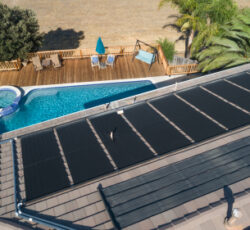 What Are The Myths About Solar Pool Heating?
What Are The Myths About Solar Pool Heating?
Solar pool heating has grown in popularity as a more sustainable and cost-effective way of heating pools. However, like any other technology, there are myths surrounding solar pool heating that may discourage some people from using it. In this blog post, we will look at the most common solar pool heating myths and debunk them.
Myth #1: Solar Pool Heating Systems are Inefficient
One of the biggest myths about solar pool heating is that they are ineffective in heating the pool. However, this is not true. Solar pool heating systems are designed to harness the natural energy of the sun and convert it into heat, which is then used to warm the pool water. Today’s solar pool heaters are highly efficient and can heat your pool temperature by up to 15 degrees Fahrenheit. With a properly sized solar pool heating system, you can keep your pool at a comfortable temperature all year round.
Myth #2: Solar Pool Heating is Expensive
Some people believe that solar pool heating systems are costly to install and maintain. However, this is a myth. While the initial cost of installing a solar pool heating system may be higher than that of a traditional heater, the savings on energy bills and maintenance costs make it a worthwhile investment. Solar pool heating systems also have a longer lifespan than traditional systems, saving you money on replacement and repair costs in the long run.
Myth #3: Solar Pool Heating Can Only Be Used in Warm Climates
Another myth surrounding solar pool heating is that it can only be used in warm climates. However, solar pool heating systems work effectively in all climates, not just warm ones. Solar pool heaters can function even during cool or cloudy days, provided they are correctly installed and sized.
Myth #4: Solar Pool Heating Systems Require a Lot of Maintenance
Solar pool heating systems require minimal maintenance once they are installed. The panels and pipes need to be cleaned periodically, but this is a simple task that can easily be performed by a pool owner or a professional. Unlike traditional pool heaters, solar pool heaters have no moving parts that can break or become clogged, which reduces the need for maintenance.
Myth #5: Solar Pool Heating Systems Take Up too Much Space
Solar pool heating systems require a significant amount of space to install solar panels and other equipment. However, advances in technology have made solar pool heating more compact, and solar panels now come in various sizes that can fit any pool area. Even if you have a small pool area, there are solar pool heating options that can fit your space.
Myth #6: Solar Pool Heating Systems Only Work During the Daytime
Another common myth about solar pool heating is that they only work during the daytime. However, solar pool heating systems have built-in thermostats that regulate the pool temperature, even when the sun is not shining. Solar pool heaters can also store heat in their panels and pipes, which can be released when the weather is cloudy or during cool evenings.
Myth #7: Solar Pool Heating Systems Can Damage Roofs
Solar pool heating systems are installed on roofs, which can lead to concerns about the system damaging them. However, solar pool heating systems are designed to be installed without damaging the roof. The system components are lightweight and specifically designed to protect the roof from any damage caused by hail, wind, or snow.
Final Thoughts
Solar pool heating is an effective and efficient way of heating your pool. The myths surrounding solar pool heating can be discouraging, but they are not true. Solar pool heating systems are cost-effective, require minimal maintenance, can function in all climates, and can be installed without damaging the roof. With the appropriate setup and installation, solar pool heating systems can provide clean warm water for you and your family to enjoy your pool throughout the year while reducing energy bills and carbon footprint.
